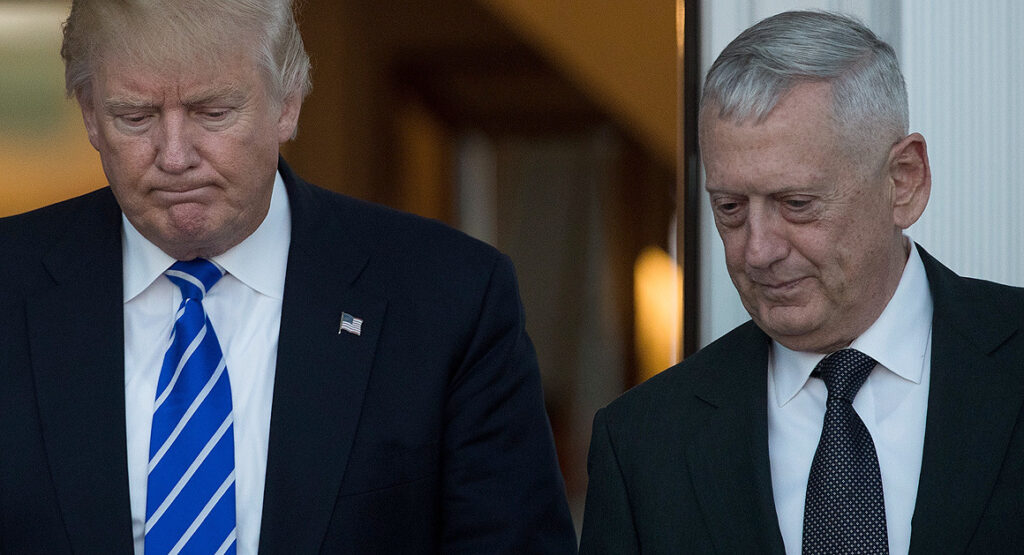
President Trump and Defense Secretary Jim Mattis
WASHINGTON: How does Trump’s Defense Secretary feel about one of the Obama Pentagon’s more controversial acts, the outreach to tech start-ups known as DIU(X)?
“I don’t embrace it,” Jim Mattis told reporters en route to Silicon Valley yesterday. “I enthusiastically embrace it, and I’m grateful that Secretary Carter (Ash Carter, Obama’s last SecDef) had the foresight to put something in place to anchor the Department of Defense out there.”
“I want to see results. I want to see what they’re doing with their location and the ideas that they’re bringing, they’re harvesting — what are we getting out of it?” Mattis continued when pressed by a skeptical press. “Absolutely, I want to see them in their mission. I’m not coming out here questioning the mission.” (Emphasis ours).
Mattis’s embrace of this Obama-era idea is just the latest sign that there’s a lot more continuity at the Pentagon in some policy areas than President Trump’s Twitter barrages would suggest. Trump blasted the F-35 stealth fighter; Mattis committed to continued production. Trump called NATO “obsolete” and said South Korea should pay for US missile defenses; Mattis reached out to allies. Trump campaigned on pledges of a Reaganesque defense buildup; his actual budget proposal has been modest. Trump promised new Navy ships and Army units; Mattis has prioritized better training and maintenance for the forces we already have. Trump said he’d made US nuclear forces stronger but they’re actually still shrinking under Obama-era arms control treaties. All modernization to nuclear delivery systems was started under Obama.
In this context, Mattis keeping his predecessor’s Defense Innovation Unit (Experimental) isn’t so surprising. Congressional Republicans have been ambivalent about DIU(X), which has offices in three strongholds of Democrat-leaning techies: Palo Alto, Austin and Boston. (Note the persistent attacks by the far right on Google and other tech companies.) House Armed Services chairman Mac Thornberry has worried aloud that DIU(X) duplicates longstanding high-tech efforts such as DARPA.
Then-Deputy Defense Secretary Bob Work visits Defense Innovation Unit (Experimental) in Silicon Valley
But there were more powerful forces at work for continuity. No less a figure than the Vice-Chairman of the Joint Chiefs, Gen. Paul Selva, told reporters last month that the Pentagon was giving DIU(X) additional funding (“reprogramming”) because it was doing deals so quickly for innovative tech. Then there was Carter’s deputy secretary, the equally technophilic Robert Work, who stayed in the job for months under Mattis until Trump’s nominee could be confirmed.
One of Work’s last acts, on July 14, was to give DIU(X) new legal authorities. One of the most significant is rapid hiring authorities that let DIU(X) bypass cumbersome federal regulations and bring tech expert onboard in as little as a day. (Similar authorities have been proposed in Congress) Another expanded the unit’s ability to set up Cooperative Research & Development Agreements (CRADAs) with private companies. Still other authorities gave DIU(X) new abilities to advertise, run prize competitions, host conferences, all methods of getting geniuses’ attention for its projects.
What has DIU(X) done to deserve more money and power? The unit’s signature achievement so far is new planning software for Air Force flight operations previously run with Microsoft Excel and markers on whiteboards. The new software cost $1.5 million, but by scheduling sorties more efficiently, it will save an estimated $131 million year in fuel and maintenance for tanker aircraft, DIU(X) says. The DIU(X) project also delivered in 120 days what a multi-year, $745 million dollar Air Force program could not.
Other DIU(X) contracts range from robotic sailboats (“saildrones”) to collect data on the ocean – vital for naval planning – to military simulations derived from commercial games.
All told, after a rough start which prompted Carter to reboot the unit, DIU(X) has spent $100 million on projects from 45 companies. These are not traditional defense contractors but commercial tech companies, mostly small ones, backed by about $1.8 billion in venture capital. The whole idea is to reach beyond the often stodgy military-industrial complex to the thriving, innovative tech sector, especially to start-ups that lack the time, connections, or specialized manpower to penetrate the defense procurement labyrinth. [UPDATE: Mattis also visited Google on Friday, but the tech giant has been leery of military contracts.] This strategy lets the military ride a train whose locomotive is massive private investment the Pentagon doesn’t have to pay for.
Now Mattis is publicly embracing this approach. In the words of a press release the Defense Innovation Unit (Experimental) put out to celebrate the secretary’s visit, it looks like “DIU(X) is here to stay.”





















